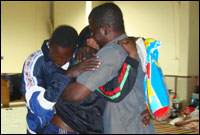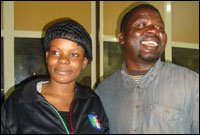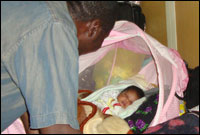When the conflict in Libya broke out, pregnant Halima and her husband Walle – Nigerian migrants who had been looking forward to a new and joyous future – had their lives turned upside down. They had planned to return home for the birth of their first child but a week before they were due to leave Libya, the crisis reached Misrata, where the couple had been living and working for three years.
Amid the sound of artillery, bombs and gunfire, they were trapped inside their apartment for two months, afraid to go out. It was not only the bombs raining down on the city that kept them there but also stories of black Africans being targeted over allegations that they were mercenaries fighting for the Libyan leader. A Libyan friend would bring them food and provisions but despite this lifeline, they rarely slept.
"On top of everything, the lack of electricity and water was unbearable. Luckily, we had stored some water in our tank. We feared the effects all this might have on our baby", Walle explains.
When an artillery shell landed in the yard outside their home, destroying the house next door, they knew they had to find a way to leave. A friend had told them of an IOM boat that was taking migrants out of the besieged city so they managed to find a car and manoeuvre their way through a series of checkpoints to reach the port.

They had to wait several days at a Libyan Red Crescent site before the IOM boat was finally able to moor. Mines and heavy shelling of the port had forced the boat to stay off-shore for five days, uncertain it would be able to carry out its sixth mission to rescue migrants stranded in the city.
But as the couple queued to board the trucks taking migrants to the dock, there was a burst of artillery fire, killing one migrant family instantly and sparking chaos among the others
"There were many wounded lying around screaming in agony. Half an hour passed before it was safe enough for the Red Crescent team to start loading people on the buses. By this time many trucks had left, never to come back. The few which remained were filled up quickly with people desperate to get to the IOM ship. I saw one truck that was full to the brink, but I told myself I must get Halima in. I better die here than she", Walle recalls.
Walle managed to get a seat for Halima but there was no space for him so he had to get off, promising to get on the next truck. But by the time he reached the port, the IOM boat had already left, with Halima on it.
For Halima, boarding the boat was a nightmare as people pushed and shoved and armed Libyans tried to prevent Africans from boarding.
"When an IOM staff intervened to stop them, they threatened to shoot him. By now artillery shells had again begun to fall in the port area. People were shouting and jostling. The crew on the boat decided to pull up the ramp and the boat started to pull away from the port. I fell down and cried in desperation as I realized we had left Walle behind", Halima remembers.

Halima arrived in Benghazi on 5th May and two weeks later, on 19th May and with no news of Walle during that time, went into labour. A day later she gave birth to a healthy baby boy but Halima refused to name him until Walle could do so. With communication between them cut, the waiting was agony.
Meanwhile, Walle and the other stranded migrants in Misrata were transferred to an abandoned house to wait for the next IOM rescue mission. No one knew how long that wait would be.
Eventually on 23rd May, Walle and the other migrants were finally taken to the port to board IOM's seventh rescue mission to Benghazi. Before he left Misrata, he somehow got word of his son's birth. Overjoyed, he named him Mohammed Oluwapelumi – which means "God is with me".
The journey east was easier with this news. Like all the other migrants evacuated from Misrata by IOM, Walle was taken to Salloum on the Libyan-Egyptian border.
Late on 24th May and with the help of IOM staff, Walle found his wife in a building at the border post where women migrants were sleeping.
Speechless with joy at this unexpected reunion, Halima held on tight to her husband as he took his baby boy in his arms.

In all the horror of conflict and the endless tragedies suffered by the migrants and other civilians, this was a rare moment of happiness and hope - as much for IOM staff as for the migrants. Seizing the opportunity, they celebrated the birth of Mohammed and Walle and Halima's reunion by handing out soft drinks to the migrants there.
But the family's journey was not over. After a few days rest, the couple and baby Mohammed finally left Salloum, bound for Cairo airport.
"I am so happy to go home. We are going straight to our family and will have another celebration at home. We have no plans to return to Libya or to go anywhere else. We will stay in Nigeria, it is our home", Walle says emphatically as they board they the IOM bus.